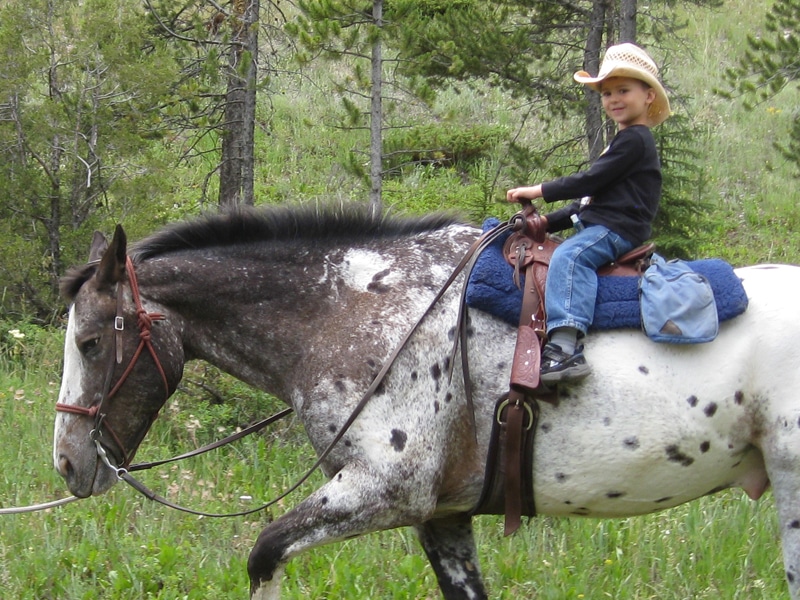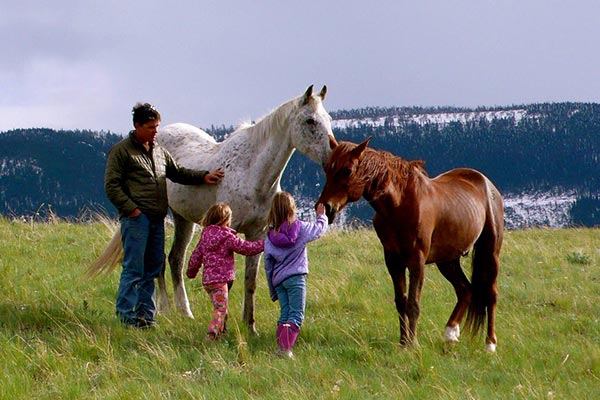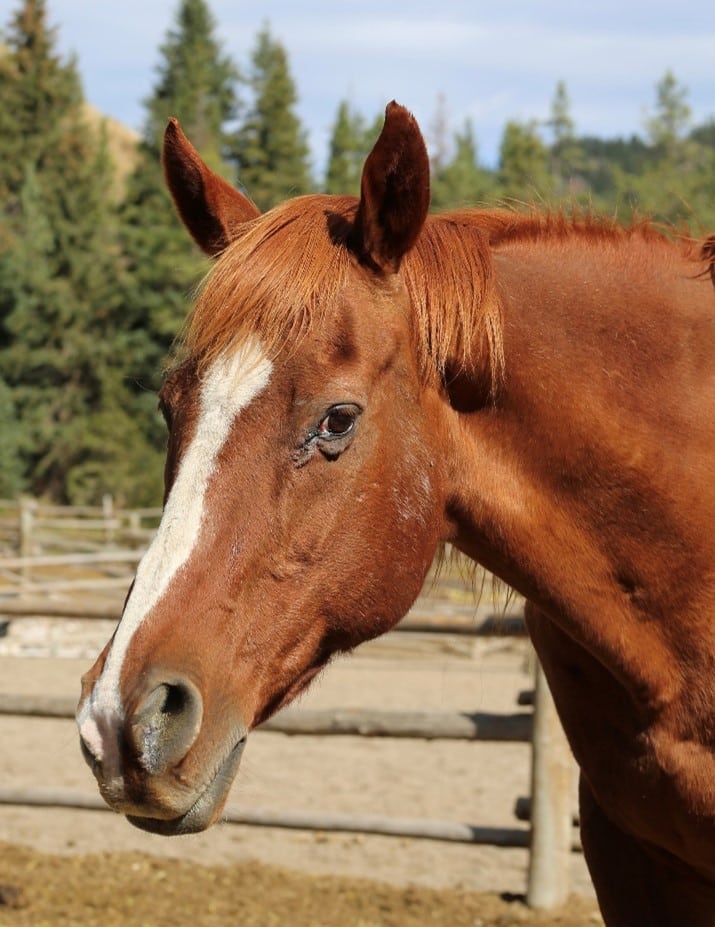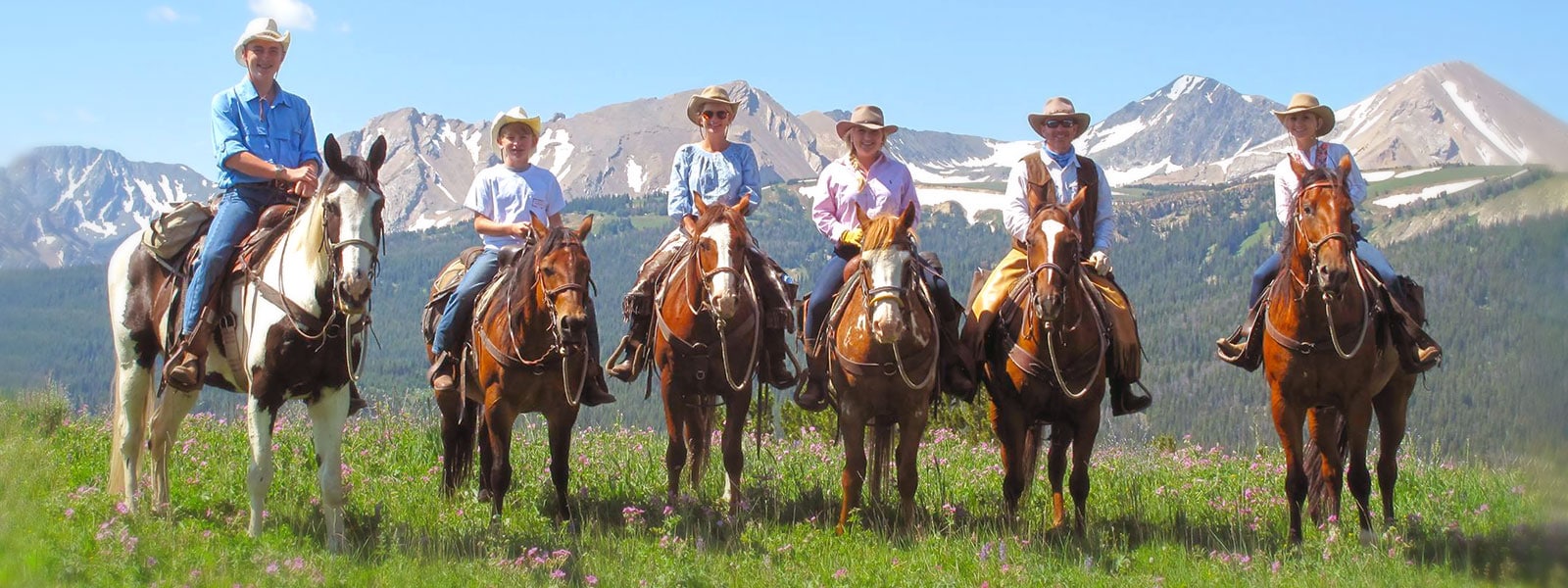We have a problem. And we found the solution…..

My husband and I own and operate a guest ranch that specializes in horses and backcountry riding. A lot of our guests that come to the ranch have horses of their own, or are experienced riders. We pride ourselves in the quality of horses that we have at the ranch, horsemanship, and the care these horses receive. I am a Certified Equine Sports Massage Therapist and a PEMF (Pulse Electronic Magnetic Field Therapy) Practitioner. We raise and train horses at the ranch. Our primary vet visits the ranch every other week, and our second vet comes out monthly to do chiropractic work, acupuncture, and dental work. Our number one priority is our horses.
This is where we ran into a problem. Horses get old. Just like you or I, we age and as we age our body does too. Even through providing top notch care from some of the very best vets in the world, horses just get old and retire from their lives as mountain or performance horses. It doesn’t mean that they need to be euthanized, it just means that they need extra care, whether that is feed, therapy, or more constant attention. Our horses have lived in their most natural environment – pasture. They are not stall horses, nor do they need to be full time stall horses. They are still healthy and happy – just ready to enjoy a quieter life. This is where we ran into an issue.
Many of our horses are raised right here on the ranch. They were born here, trained here, rode by wranglers here, advanced riders, and eventually brand-new beginners or six-year-old kids. Some horses grew up with kids at the ranch, meaning guests came year after year riding the same horse when they visited. A bond grows between horse and rider, they helped that person through difficult times in their life, helped to heal someone, helped to overcome a fear, or helped to show them some of the most beautiful country on horseback! But as time passes, horses age and these mountains become harder and harder for them.
Our horses are our best and hardest working employees. They do their job each week and change hundreds of people’s lives each year, and just because they’re too old for that job doesn’t mean we send them down the road. It makes me sick to think of a horse, who did right by so many people for so many years, being unable to spend his life in his home just because “he got old.” And I know what you are going to say, well why can’t he just stay there? And until now, that is exactly what they are doing. However, as a small family-owned business, financially this is non sustainable.

Over the last decade we have successfully retired over 50 horses throughout the United States. Most of these placements are long time guests of Covered Wagon Ranch that just want to help, such as Bill and Lyn from Somerville, Tennesse (who were featured in last month’s blog), Snow and Henry from Memphis Tennessee, Julanne Portis from West Memphis Arkansas and the Addy’s from North Dakota. All these guests have farms at home and the means to continue to care for these horses. For some, it is a horse that they grew attached to while visiting the ranch or sometimes a horse they do not even know. We always retire in bonded pairs together, so they can live out their days beside their best friend. This has been a means to an end for as long as I have been here, but unfortunately their farms are full, and they can no longer take on more horses.


Over the last several years, we have accumulated several horses who can no longer be mountain horses for the ranch, but who we care deeply about and can’t bear to send away. Every guest ranch, even every horse owner, runs into this problem, but we’re not ones who can look the other way and allow their quality of life to deteriorate. To get to retirement, they must work pretty dang hard, and we have deep gratitude for our beloved animals who toted hundreds, sometimes thousands, of people up and down these Montana mountains.

This is an extremely difficult and emotional topic to discuss. Roughly 25,000 horses a year are sent to Canada for slaughter. I want to make it very clear that I am not judging someone for the choices they must financially make; however, I cannot personally do this to our horses. This is when a lightbulb popped on in my head. Our “retired” horses, who can’t trail ride in the mountains anymore for various reasons, continue to live the life they have had, minus the working part. They spend their days in pasture with the working herd, they get their extra feed if needed, they get routine vet visits, extra care from us and whatever else they may need, but they are essentially unable to earn their keep. The number of stock in the corrals continues to increase, but the amount of usable stock does not. This is essentially the problem, but I feel I have found the resolution.
We are founding a non-profit “Forever After All” that will allow all our retired horses to stay with the ranch, forever after all. They get to continue living their best life with their horse friends they were raised with, in the environment they were raised in, and nothing changes for them except that they are retired. They maintain the quality of life they deserve, and that Kurt and I are determined to give them. This feels like a piece of our puzzle that was always meant to be there but has taken much time and planning to bring to fruition.
There are a few things I know you will have questions about, so here’s what I know at this point:
How are you going to keep them separate from business horses financially?
The books will be separate, vet records, hay costs, etc. It will be a separate entity.
Aren’t there already facilities out there that do this, or equine therapy businesses that need horses and you could just give them away?
Sure, there are places out there that need horses, but they need sound horses. If our horses were sound or able to work, we wouldn’t be in this predicament. These horses need a place to just be a horse. Up to 90% of horses will get ulcers from change in their environment. Let me talk about ulcers in layman’s terms for just a moment for those that do not know what they are. There are two different types of ulcers. Squamous ulcers occur in the upper part of the stomach close to the esophagus and are called Equine Gastric Ulcer Syndrome. Glandular Ulcers are found in the lower part of the stomach and are referred to as Equine Glandular Gastric Disease. Essentially it is build up hydrochloric acid within the stomach which can be extremely painful and result in loss of appetite, loss of weight, poor body condition, chronic diarrhea, depression and so many other things. If we change a horse’s environment there is up to a 90% chance that they will get ulcers. If the receiving party is willing, they can do ulcer treatment and help to alleviate this problem.
Why now? Wasn’t this a problem before?We retire horses for all kinds of reasons. Bear in mind that our herd is made up of horses that were bred and raised here, horses we rescued, and horses from all kinds of backgrounds. Some horses can continue being ridden until later in life than others. Every situation is unique. Beginning in their late teens into early twenties, they require more care than when they were younger. That’s just how it goes. Plenty of young and fit horses have to be retired earlier than we would like because they have health issues that make them unsound. And as you all know, we do not, ever, send an unhealthy or in-pain horse out on the trails. Health and wellbeing have always come first. However, we still have the problem that we have a horse that is no longer able to be ridden and our retirement guest’s farms are full. We have a lot of guests that expressed interest in helping, but they are unable to physically adopt the horses. Some of them live in a large city and a few have said they could board them in a stall. And yes, you could board them in a stall, but you run into the issue of ulcers, the horse making the trip, as well as these ranch horses that have spent their entire lives in large corrals (in the summer) and pasture in the winter being boarded in a 12X12 stall. The only time they have been in a stall is for a short time for injuries or rehab. It is also not a cheap endeavor to put a non-usable horse in a stall, costing anywhere from $500-$1200 per month depending on the location. People want to help, but the reality of adopting a horse is anything but simple.
Here’s where Forever After All is going to change the game.
I am asking for your support. I am at the beginning stages of creating the non-profit which will be a 501C3. For our existing retirees and for those who will be retired within the next year, we will create profiles with their age, history, and what we love about them, and you can essentially sponsor one of our horses. These horses will continue to stay in the same environment and have the same care they have received over the years; however, they would have your financial support. You will be the reason that they can stay in their home, with their friends, with anything they might need as they age. As of now the 501C3 is a work in progress, but this takes time. I have received my FEIN number, I have a board put together, and my business plan is in the works. In the meantime, if you would like to support Forever After All (before it is officially a 501C3). You can Venmo @CWR-1925 or Paypal office@coveredwagonranch.com. Please be sure and put Forever After All as the subject so that money can be dispersed correctly. We will be setting up a Venmo, Paypal and Bank Account for Forever After All in the next couple of months.
This has taken years to morph from just an idea into something real. We ask for your patience as we continue down the road of making this into everything Kurt and I dream it can be. Please be sure and find Forever After All on Facebook and Like and Follow for more information. We want to say thank you to everyone over the years who have helped and wanted to help and offered their support. You all are making this possible! I truly believe that Forever After All will become one of the most important parts of the Covered Wagon Ranch. More information coming soon…

-Kurt Melissa Braxton & Sawyer


What a grand idea!!
What a wonderful writer you are, Melissa! I’m in happy tears reading this about your aging horses and the love and care yju give shines through every word! I’d love to donate what I can, I’d love it to be Prism ( if possible) ) when he/she retires. I’ll follow FB page and please keep me in mind. Still want to come ride one of these summers!
Love what you are doing.
Love this!!
This is beautiful and amazing!! God will bless you and all the horses for this!
You guys are the greatest! I love what you are doing for your horses.
There’s a lot of heart in this.. Its a great idea.. Here’s hoping its a resounding success… xo
The Pucketts’ continue to amaze me with their kindness and innovative ideas. This is a wonderful plan for these fabulous horses.
Good on ya!! These animals need to be respected for all their hard work, and should have the privilege of living out their final years in a familiar, safe place. This is a fantastic way to accomplish that! Bravo!!
I have known Kurt for along time! He has always Loved Horses! If anyone can make this work, he can!
Absolutely the greatest gift to these horses, is to always love and care for them! Congratulations for extending to them their lifetime of care and happiness!
This is great news! Bravo! A great retirement for those partners that have served so many so well!